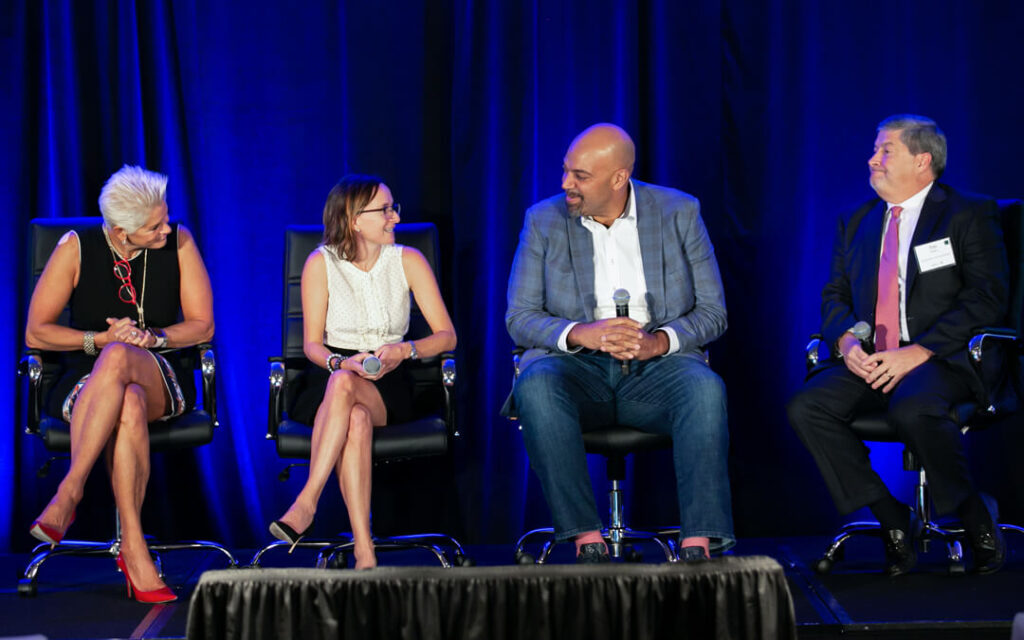Teams: Good for Agents, Good for Brokers…and Good for Consumers, Too
By Maria Patterson
(Above, L to R) Louise Phillips Forbes, Louise Phillips Forbes Team, Halstead; Jenn Smira, Jenn Smira Team, Compass; Bo Menkiti, The Bo Menkiti Group, Keller Williams Capital Properties; and Tim Milam, Coldwell Banker Sea Coast Advantage, discuss “Managing Your Real Estate Sales Force: Adopting and Maximizing Teams” at RISMedia’s 2019 Real Estate CEO Exchange. (Credit: Korin Krossber of PlanOmatic)
From the nurse taking your vitals to the anesthesiologist administering the meds to doctors prepping the operating room, there’s a whole group of professionals responsible for the successful outcome of your procedure long before the surgeon even shows up. It’s teamwork at its finest. Verl Workman, founder and CEO of Workman Success Systems, used the story of his own back surgery to illustrate the value of professional teams and set the stage for the panel discussion he moderated during RISMedia’s recent Real Estate CEO Exchange, “Managing Your Real Estate Sales Force: Adopting and Maximizing Teams.” “Today’s consumer is trained to work with teams,” explained Workman, “but then they get to real estate and work with a general practitioner who wants to be good at everything—and the customer sometimes suffers. The agent who believes they’re the only one who provides great service doesn’t understand the nature of the transaction.” The ultimate goal of a team is to provide a better experience for the client, grow business and work/life balance for agents, and increase profitability for brokers. Workman’s panel brought together both team leaders and team-friendly brokers to reveal their strategies for maximizing the relationship to the benefit of both. From the brokers’ perspective, supporting agent teams within the firm simply makes good business sense. “They’re our partners in the business,” said Bo Menkiti, founder and CEO of The Bo Menkiti Group, Keller Williams Capital Properties, with more than 1,000 agents serving the Washington, D.C., area. “If we’re going to hit our goals, we can only be so many places at a time, so teams make sense. Also, there are agents who are not the best rainmakers, but can bring their skills and talents to teams in other ways and help them grow their business. And as they grow their business, they grow our marketshare. They’re the icons of our market—the ones people want to be around.” Tim Milam, president of Wilmington, N.C.-based Coldwell Banker Sea Coast Advantage, was on the forefront of the team trend. “I bought the company in 1997, and in 1998, someone started talking about teams,” he explained. “It made a lot of sense to me. We were the first company in our area to adopt and embrace teams. Sixty-three percent of our agents are on a team or a team leader. When you’ve got agents doing 5-7 transactions a year, they can’t make a living that way, and are happier if you put them on a team. We work for our agents—they don’t work for us.” Workman then addressed a common concern of many brokers when it comes to teams: that they’ll leave to become their own brokerage. “But the majority of team leaders don’t want to be the broker of record,” he explained. Jenn Smira, executive vice president, Jenn Smira Team, Compass, concurred.
(L to R) Verl Workman, Workman Success Systems; Louise Phillips Forbes, Louise Phillips Forbes Team, Halstead; Jenn Smira, Jenn Smira Team, Compass; Bo Menkiti, The Bo Menkiti Group, Keller Williams Capital Properties; and Tim Milam, Coldwell Banker Sea Coast Advantage, at the CEO Exchange (Credit: Korin Krossber of PlanOmatic)
“I wouldn’t want to deal with headaches like me,” quipped Smira. “I have transaction help, I have marketing help. I have the best talent and resources available to help me do what I need to do. I have no interest in going independent.” “Growing my team was about getting help on the things I couldn’t do well,” added Louise Phillips Forbes, broker of the Louise Phillips Forbes Team, with New York’s Halstead Real Estate. “I’m staying at Halstead because I want to focus on what I love doing. It was insightful for Diane (Ramirez, CEO of Halstead) not to make me try to fit in a box.” Workman also tackled one of the most complicated issues that often arise between brokers and teams: compensation models. Milam said he has a written policy; however, it is just a guideline that can be changed. He offers new agents a 50-60 percent split and no cap, reporting that the majority are on a 75-80 percent split. He emphasized that it’s “all about the value” and the services the brokerage provides in return. Menkiti, however, would like to see the compensation conversation start to change. “So much of the business is focused to think about splits,” he said. “Sales volume and splits don’t pay the bills. We have to start thinking differently. You have to think about people collectively producing value.” To that end, Menkiti is creating a team cap. Forbes and Smira have both learned by trial and error when it comes to compensating team members. While Forbes spent many years paying team members on every deal “whether they touched the business or not,” after participating in executive coaching and partnering with Halstead for guidance, she now utilizes a more formal structure where team members average 28-32 percent of every transaction. Smira, who boasts eight team members making six figures, compensates team members 40 percent of every lead they bring in. Originally, it had been 70 percent. Achieving a successful marriage between brokers and teams is ultimately all about balance. “As we’ve seen the evolution of teams, brokers went from being so anti-team that we held teams back,” explained Menkiti. “Then teams got really aggressive and started operating as general brokerages, and when that happens, the team ceases to add value. The role of brokers is to empower entrepreneurs.” For CEO Exchange continuing coverage, visit RISMedia.com. Maria Patterson is RISMedia’s executive editor. Email her your real estate news ideas at [email protected].
Maria Patterson is RISMedia’s executive editor. Email her your real estate news ideas at [email protected].
You can find this article and more at: https://rismedia.com/

